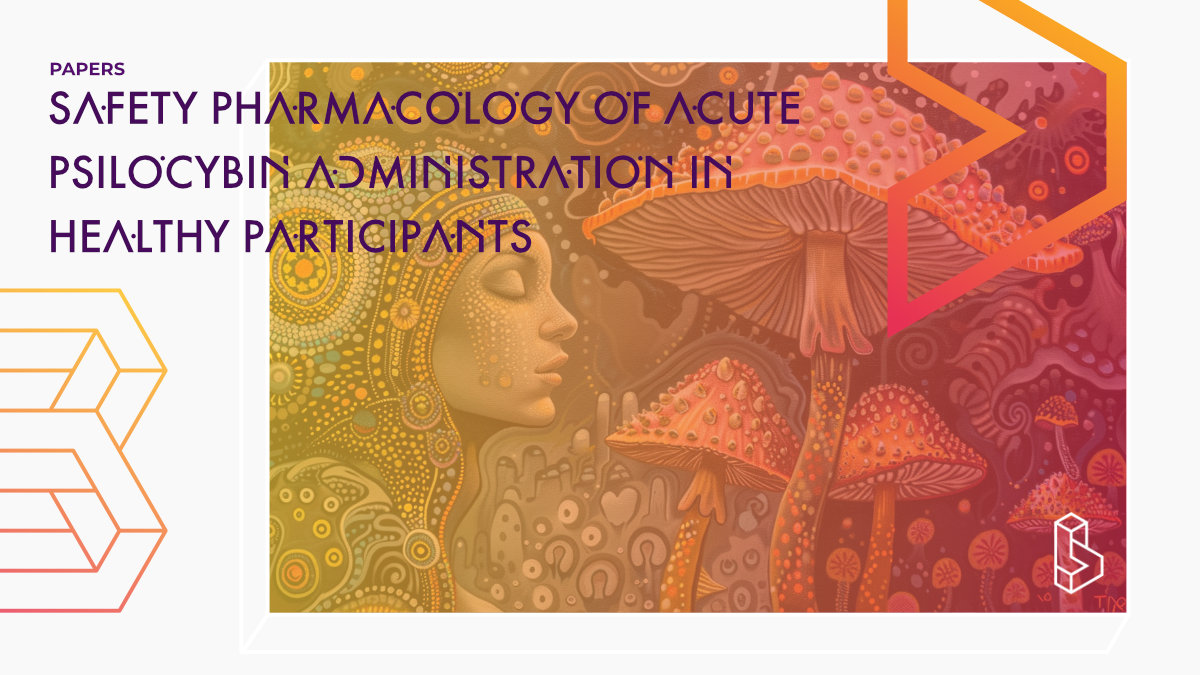This pooled analysis (n=85; doses=113) of three randomized crossover studies evaluates the safety pharmacology of psilocybin (15-30mg). Psilocybin induced stronger effects at higher doses, with 25 mg and 30 mg doses showing increased anxiety. However, overall, psilocybin was found to be safe in terms of acute psychological and physical harm, with no serious adverse reactions reported, suggesting its potential safety for controlled research settings.
Abstract of Safety pharmacology of acute psilocybin administration in healthy participants
“Psilocybin is being studied for its therapeutic potential in various mental health disorders, such as depression, anxiety, and addiction. Initial studies suggested that psilocybin is generally safe when used under controlled conditions, but more research is needed to better understand its safety profile. We report safety pharmacology data from a pooled analysis of three randomized crossover studies that included 85 healthy participants and 113 single-dose administrations of psilocybin. Single oral doses included 15 mg, 20 mg, 25 mg, and 30 mg psilocybin dihydrate. We investigated subjective effects, blood pressure, heart rate, body temperature, acute and subacute adverse effects, reports of flashbacks, and liver and kidney function before and after the studies. The 20, 25, and 30 mg doses of psilocybin produced stronger effects than the 15 mg dose. Psilocybin at all doses induced higher “good drug effects” than “bad drug effects.” Only the 25 and 30 mg doses increased anxiety. Psilocybin elevated autonomic effects only moderately. Tachycardia (>100 beats/min) was observed with 7% of all psilocybin administrations. Body temperature >38° was reached in 7%, 9%, 17%, and 32% of the participants with the 15, 20, 25, and 30 mg doses, respectively. Kidney and liver function parameters were unaltered at the end of the study. Five participants (6%) reported transient flashback phenomena. No serious adverse reactions occurred. These findings suggest that a single administration of psilocybin is safe with regard to acute psychological and physical harm in healthy participants in a controlled research setting.”
Authors: Isabelle Straumann, Friederike Holze, Anna M. Becker, Laura Ley, Nepomuk Halter & Matthias E. Liechti
Summary of Safety pharmacology of acute psilocybin administration in healthy participants
Introduction
Psilocybin is a classic psychedelic that is used recreationally and has been investigated clinically for depression, anxiety, addiction, cluster headache, and migraine. Additional indications are under investigation. Initial studies suggested that psilocybin is generally safe when used under controlled conditions, but more information on clinical safety is needed. Safety concerns include challenging experiences, acute anxiety, flashbacks, and hallucinogen perception disorder. A series of clinical Phase 1 trials were conducted in healthy participants to evaluate the safety pharmacology of single-dose administrations of psilocybin. Blood laboratory markers of kidney and liver function were measured at the start and end of the studies.
Experimental procedures
Find this paper
Safety pharmacology of acute psilocybin administration in healthy participants
https://doi.org/10.1016/j.nsa.2024.104060
Open Access | Google Scholar | Backup | 🕊
Cite this paper (APA)
Straumann, I., Holze, F., Becker, A. M., Ley, L., Halter, N., & Liechti, M. E. (2024). Safety pharmacology of acute psilocybin administration in healthy participants. Neuroscience Applied, 104060.
Study details
Compounds studied
Psilocybin
Topics studied
Anxiety
Healthy Subjects
Study characteristics
Original Re-analysis
Placebo-Controlled
Double-Blind
Randomized
Re-analysis
Participants
85
Humans
Institutes
Institutes associated with this publication
University of BaselThe University of Basel Department of Biomedicine hosts the Liechti Lab research group, headed by Matthias Liechti.
Compound Details
The psychedelics given at which dose and how many times
Psilocybin 15 - 30mg | 2x
Linked Research Papers
Notable research papers that build on or are influenced by this paper
Comparative acute effects of mescaline, lysergic acid diethylamide, and psilocybin in a randomized, double-blind, placebo-controlled cross-over study in healthy participantsThis randomized, double-blind, placebo-controlled, cross-over study (n=32) investigated the effects of mescaline, LSD, and psilocybin at psychoactive-equivalent doses. The acute subjective effects of these substances were comparable, and all had moderate autonomic effects with minor differences in diastolic blood pressure and heart rate. Mescaline induced slightly more subacute adverse effects, and differences were found in the duration of action, with mescaline lasting the longest.
Direct comparison of the acute effects of lysergic acid diethylamide and psilocybin in a double-blind placebo-controlled study in healthy subjects
This RCT (n=28) compared the effects of LSD (100 & 200µg) and psilocybin (15 & 30mg) to placebo. Findings include that the doses of 100 & 200 µg LSD and 30 mg psilocybin produced comparable subjective effects. LSD at both doses had longer effect durations than psilocybin. Psilocybin increased blood pressure more than LSD, whereas LSD increased heart rate more than psilocybin. Ultimately, any differences between LSD and psilocybin are dose-dependent rather than substance-dependent.
Acute effects of psilocybin after escitalopram or placebo pretreatment in a randomized, double-blind, placebo-controlled, cross-over study in healthy subjects
In this double-blind, cross-over, the effects of psilocybin (25mg) were assessed in healthy volunteers (n=23) who had been taking the antidepressant escitalopram (10-20mg, 14 days) or placebo before psilocybin treatment. Pretreatment with escitalopram had no relevant effect on positive mood but significantly reduced bad drug effects and adverse cardiovascular effects.

